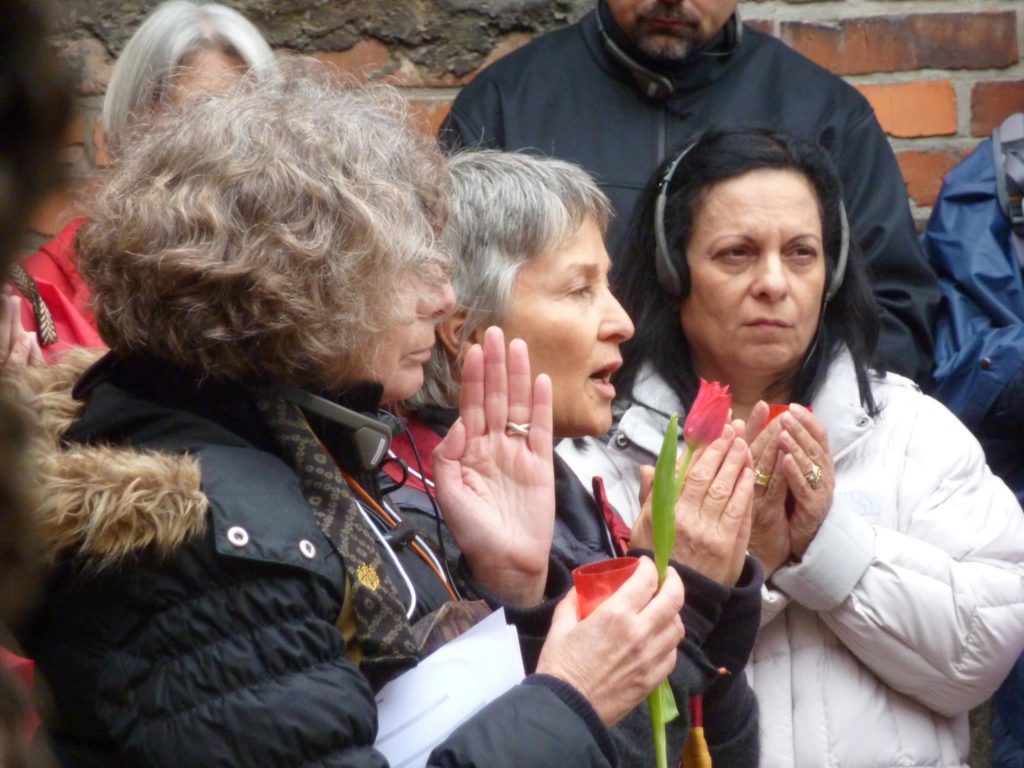(Iris, on right, during 2013 Zen Peacemakers Auschwitz/Birkenau Bearing Witness Retreat)
This post is another in the series “Flowers on the Edges of Graves” –
reflections from 20 years of participants in the Zen Peacemakers
Auschwitz/Birkenau Bearing Witness Retreats since 1996.
By Iris Katz, Israel
OSWEICIM, POLAND. It was in November 2010. It was my first time in the Bearing Witness Retreat in Auschwitz. Three months before I have visited Bernie in Montague, USA. He had been telling me about the retreat, I told him that I had never been to Auschwitz. I used to have my own fears which prevented me to go there. They were connected to all that I have known about Auschwitz. Bernie convinced me to go. I went.
I had “my” two tenets to follow: Not-Knowing and Bearing Witness. The first one was very important for me. Forgetting all I knew, all that had made me afraid and horrified of the Holocaust and its Jewish victims that for me was the main issue about Auschwitz till then. Not-Knowing helped me to go, to be there and to bear witness with some sort of empty mind. Many experiences and few transformations were the outcome of my first retreat in Auschwitz. But one of these experiences changed my life. This one was connected to Ihab, the Israeli-Palestinian from the city of Jaffa, Israel.
Ihab, my husband Tani and I became close friends during the retreat. We felt like cousins (which we are, mythologically) or friends who grew up together since childhood, many years back. We speak the same language, share the same history, and have the same background and ideas. I mean, I felt close or oneness with many people in the group. I felt close to psychologists or therapists, for example. I felt close to the victims and I even could feel their guards who had been “sharing” their lives on that place. But with Ihab it was different. We had our jokes, our joint stories, our small idiosyncratic talks, our combined ideas. But … I was an Israeli, a Jewish Israeli, and Ihab was Israeli as well, but “Arab” Israeli, as we keep saying in my country, or Palestinian Israeli, as “they” keep saying in my country. “They,” that is the “Arabs” in Israel. It was a painful recognition to reflect on that in Auschwitz Ihab and myself were equals, close, just the same people, having different religions – but in Israel we were not equal at all. Mainly, our particular communities were not equal at all. It was like a wide opening in my consciousness: the insight, active and alive in me, that I have to do something about this. This special and deep insight into my sick society has brought me to the decision that has become a path in my life. This path was dedicating myself to give my share in making “Arabs” and “Jews” in Israel more equal, bringing them closer, having them experience the same recognition, respect, and dignity.(…)
This is an excerpt and appears in full in the book “AschePerlen – Pearls of Ash & Awe. 20 Years of Bearing Witness in Auschwitz with Bernie Glassman & Zen Peacemakers” (2015) Edited by Kathleen Battke, Ginni Stern, and Andrzej Krajewski, in German and English. Printed copies or e-book available at: https://janando.de/steinrich/en



One Response
Thank you Iris.